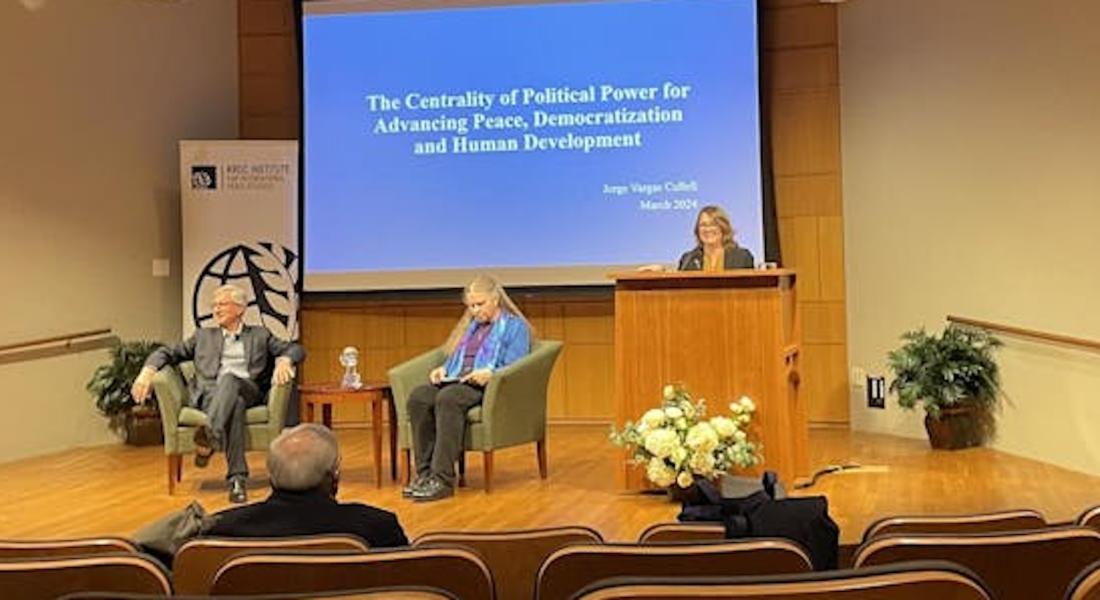
On Tuesday afternoon in the Hesburgh Center Auditorium, Jorge Vargas Cullell, a 1994 masters graduate from Notre Dame and director of the Programa Estadio de la Nación in Costa Rica, was given the 2024 Distinguished Alumni Award by the Kroc Institute for International Peace Studies. Cullell received a masters degree from the Kroc Institute in 1994 and a doctorate in government and international studies in 2006. Additionally, Vargas Cullell was a Dissertation Year Fellow at the Kellogg Institute for International Studies.
The Kroc Institute grants the award anually to graduates of the Kroc Institute “whose careers and lives exemplify the ideals of international peacebuilding,” according to the Institute’s website.
As director of the Programa Estadio de la Nación, founded in 1994, Cullell issues an annual report on the state of democracy and sustainable development in Costa Rica.
After receiving the award, Cullell delivered a lecture discussing the reasons why peace agreements succeeded in stopping civil wars in central America during the 1980’s and 1990’s.
Cullell focused specifically on four agreements: the 1987 Esquipulas Agreement between Costa Rica, El Salvador, Guatemala, Honduras and Nicaragua, the 1988 Sapoá Accord in Nicaragua, the 1992 Chapultepec Accord in El Salvador and the 1996 Guatemala Peace Accord. These agreements brought to an end both civil wars and inter-state wars.
Cullell explained the impact these agreements had on the region.
“These peace agreements ended civil wars in Central America and were met with huge hope and expectations in societies ravaged by decades of instability, social exclusion and political violence,” he explained. “That was our opportunity to do things differently, to leave the authoritarian legacies behind, to do something to ameliorate social inequalities.”
Cullell noted some improvements have been made since the agreements were signed. Some economic and social development has occurred, more foreign investment has entered the region and peace has been more prevalent, with no interstate war occuring.
“Not a small feat in a region which has previously been caught in a never-ending cycle of political violence.”
Roughly three decades after these agreements were signed, however, much of this optimism has faded, Cullell argued. Cullell pointed to the fact that economic growth remains low in the region and that democratic backsliding has occurred with only one “true democracy” — Costa Rica — remaining in the region.
“Citizen support for democracies is falling into a minority in most Central American countries,” he lamented.
Cullell pointed to the nation of El Salvador as an example of this phenomenon. Cullell explained that there was widespread rejoicing throughout the country when the Chapultepec Accord was signed in 1992, which marked the end of the civil war. He was in El Salvador at the time the agreement was signed.
Today, however, the government of El Salvador has condemned the agreement and destroyed a monument commemorating it. Cullell noted the dispassionate response to the reversal of the peace agreement in the country.
“When the government rewrote history and threw the agreement into the dustbin, few cared,” he said.
Cullell described two main reasons for the failure of the peace agreements: the agreements were too narrow and a systemic failure in leadership occurred in the region.
On the first point, Cullell argued Central American nations believed democracy involved only holding elections and was independent of human development initiatives.
“The whole program for building strong independent institutions, for enforcing open transparent and accountable governance, for opening up the opportunities for citizen participation in education and public policy, was pushed to the back burner,” he said.
When it came to the leadership failure in the region, Cullell, in addition to blaming Central American leaders for not working hard enough to maintain democracy and promote human development, also blamed the United States for failing to promote democracy after often funding groups in civil wars such as the Contras in Nicaragua.
“The US, the main international investor in the Central American wars, simply opted out when peace was assured,” he noted.
In order for democracy to thrive again in the region, Cullell argued, human development must be prioritized.
“We have to convey the idea once again that democracies fall out without human development,” he said.
This story originally appeared in ndsmcobserver.com.
The Kellogg Institute for International Studies, part of the Keough School of Global Affairs at the University of Notre Dame, is an interdisciplinary community of scholars and students from across the University and around the globe that promotes research, provides educational opportunities, and builds partnerships throughout the world on the themes of global democracy and integral human development.





